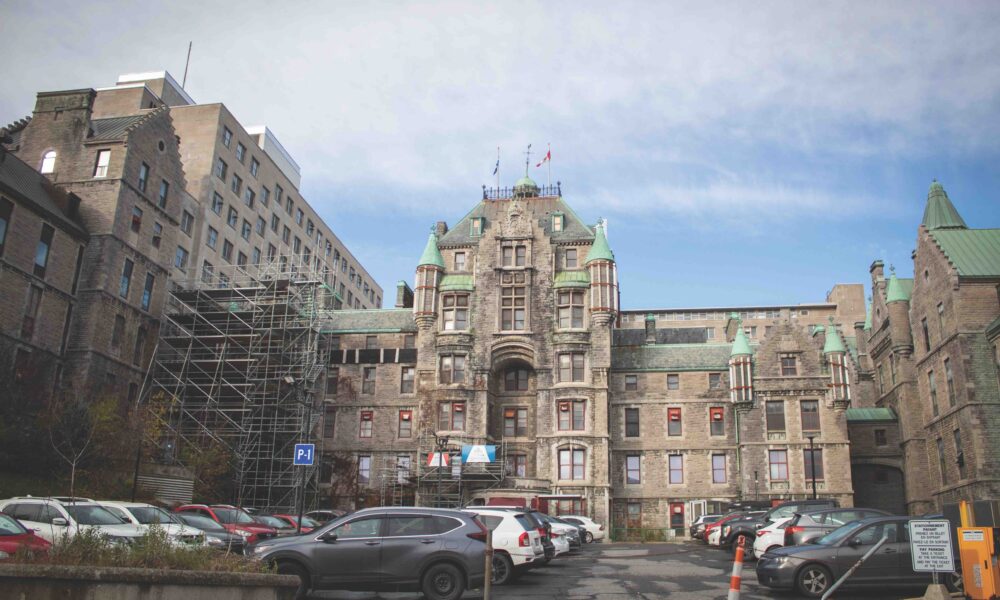McGill has stated it is open to looking further into the possible presence of unmarked graves of Indigenous children on the Royal Vic site, according to a letter published by the office de consultation publique de Montréal (OCPM) on Nov. 9. The letter, written by Christopher Manfredi, McGill’s provost and vice-principal (Academic), comes after Indigenous activists called for a halt to McGill’s New Vic Project so an investigation could be conducted. The Société québécoise des infrastructures (SQI) has formally invited the Mohawk Council of Kahnawà:ke to collaborate with them in the investigation.
Kanien’kehá:ka kahnistensera (Mohawk Mothers), a group from the Kanien’kehá:ka nation, believe Indigenous children may have been among victims of the torture experiments conducted by Dr. Donald Ewen Cameron at the Allan Memorial Institute—a former psychiatric hospital next to the Royal Victoria Hospital—in the 1950s and 1960s. The group also suspects that the children were buried at the site.
Kwetiio Wakskarewake, a Mohawk Mother, explained what McGill’s willingness to cooperate means for the Indigenous community.
“For [McGill] to have a response to us speaking up and responding is a step in the right direction for somebody to take responsibility,” Wakskarewake told The McGill Tribune. “We cannot let it go on any longer that we are silenced or buried on the ground with no one claiming us. That is very important to us, that people understand and know the real history of the onkwehonwe people and that this land has never been given up.”
In a statement to the Tribune, the Students’ Society of McGill University’s (SSMU) Indigenous Affairs Commissioner pointed out McGill’s lateness in following up with the kahnistensera’s concerns.
“SSMU Indigenous Affairs expresses complete and utter dismay […] at how the issue of the pre-colonial Iroquois village and the unmarked graves of children were handled from the very start when concerns were raised by the rightful representatives of the kanien’keha:ka community,” wrote the commissioner.
McGill media relations officer Frédérique Mazerolle reiterated the university’s commitment to reconciliation in the context of the New Vic Project.
“The McGill community views reconciliation as fundamental to the pursuit of our academic mission and our relationship with Indigenous people,” Mazerolle wrote to the Tribune. “We are committed to collaborating with governments and Indigenous community leadership to undertake the work necessary to investigate [the site].”
A press release from Kahentinetha, a kanien’keha:ka kahnistensera (Mohawk Mother) of the Bear Clan and founder of Mohawk Nation News, on Nov. 14 states that as the kanien’keha:ka kahnistensera are the keepers of the unceded land the Royal Vic site is located on, all procedures pertaining to the investigation must go through them.
While the kahnistensera approve of McGill’s willingness for an investigation, they are concerned about how the investigation will be carried out. They have also questioned the involvement of the Band Council Offices of Kahnawake and Kanehsatake, who were invited to collaborate on the investigation by the Société Québécoise des Infrastructures (SQI) as Indigenous community representatives.
The kahnistensera deem these Band Councils a conflict of interest for the investigation as they are federally imposed governance structures. Band Councils, in the kahnistensera’s view, do not adequately represent the kanien’keha:ka people. Instead, the kahnistensera wish to conduct and lead the investigation themselves.
“Many times the people are left out of the conversation and it is handed to a Band Council, and that is not the way onkwehonwe (first peoples) works,” Wakskarewake said. “We will do what we need to do to take care of the land and the soil, and especially the children. We haven’t had that conversation [with McGill]. If any information is to go to [the Band Council, it needs to be redirected] through kahnistensera.”
The kahnistensera are currently reaching out to the McGill administration to advocate for the Band Council to be removed from investigation procedures and to instead have the kanien’keha:ka kahnistensera supervise the investigation.









